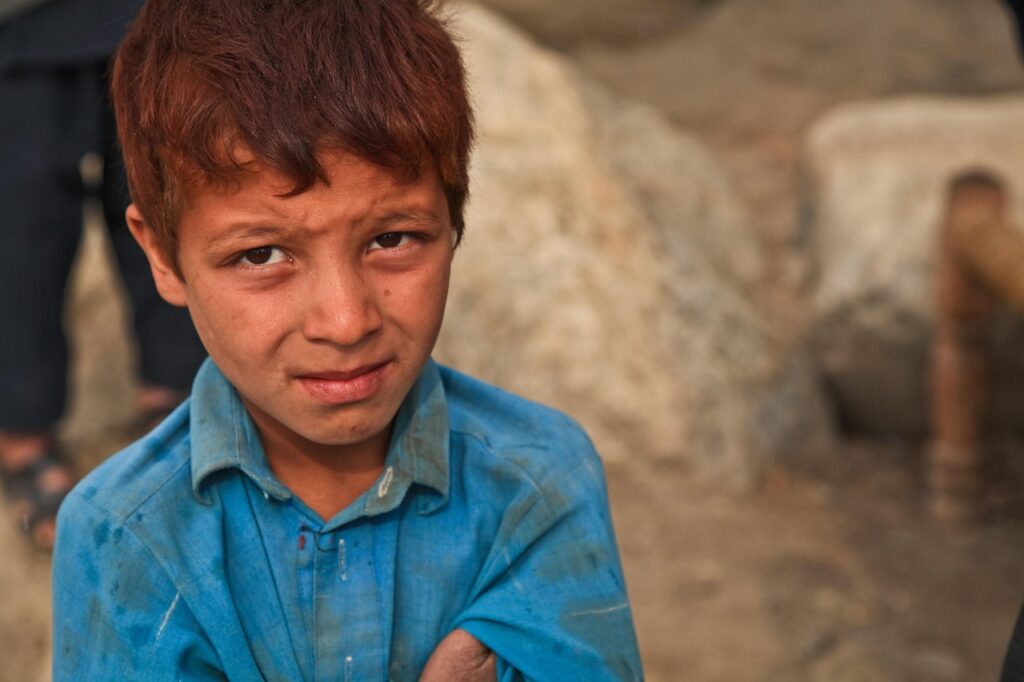War was never meant for children.
Yet across borders and broken cities, they are the ones who suffer the most—caught in the chaos of conflict, learning to walk not on playgrounds but on paths strewn with rubble. Growing up between the sharp crack of bullets and the soft, persistent whisper of belief.
This is not a story from a faraway land in history books. It’s a story of now. A story that repeats itself in different corners of the world—wherever peace is a luxury and fear is a daily visitor. But in every place where war tries to silence life, there are small, defiant voices that refuse to give up.
This blog is about one of those voices.
Meet Rehan.
He’s twelve years old. He should be in Year 7, laughing with friends, complaining about homework, and dreaming about scoring the winning goal in a football match. But Rehan’s reality is different. His school is a pile of bricks. His classroom’s blackboard is cracked and faded. His books are few and torn. His football, once bright red, lies forgotten in a corner under dust and debris.
Yet Rehan wakes up every day with the same spark in his eyes.
He helps his mother sweep the floor of their small home—a home that once had four rooms and now barely has one. He folds his little sister Amina’s clothes neatly, even though they have holes from too much wear. He listens to the radio when it works, especially the music programmes, and sings quietly to old songs his father once loved.
Rehan’s father went missing six months ago. No one knows whether he’s alive or gone, and people have stopped asking. But Rehan hasn’t. He believes that one day his father will return—walk through the door, smiling, holding two fresh loaves of bread and a small surprise, like he always did.
That’s the thing about belief.
It doesn’t shout. It doesn’t demand proof. It simply is.
In the midst of gunfire and grief, belief becomes a quiet, powerful act of survival. Rehan believes in peace. He believes in stories, in stars, in handwritten notes tucked under mattresses, in kindness passed between neighbours who have little themselves. He believes in beginnings, even as endings surround him.
It isn’t just Rehan. Belief lives in the small gestures of those around him.
His mother still wears kohl in her eyes every morning because her husband used to say she looked happiest that way. She still hums lullabies to Amina, even when the sounds outside make it hard to sleep. An old man down the street waters a dry plant outside his door—because hope, like roots, needs attention.
Belief doesn’t rebuild homes, but it helps rebuild hearts.
It can’t stop bullets, but it can stop hate from settling in.
It cannot erase loss, but it helps carry it gently.
Sometimes I wonder how people like Rehan do it—how they find strength when everything around them is crumbling. And the answer, I think, lies in what they choose to hold onto. They hold onto belief. Not because it’s easy, but because it’s the only thing they truly own. Everything else can be taken—homes, comfort, certainty—but not belief.
And that is where the world must learn.
In our own lives, we may not face bombs or borders, but we too live between battles—battles of the mind, of identity, of expectations. In those spaces, belief still matters. Belief in love, in truth, in justice, in change. Belief in better.
So let us be more like Rehan. Let us believe not just in ourselves, but in the goodness of people, in the power of peace, and in the ability of even the smallest hope to rise against the loudest fear.
Because between bullets and belief, it is belief that has the power to rebuild what war tries to destroy.
And sometimes, that soft flame is all it takes to light a new dawn.
Image courtesy : https://pixabay.com/users/armyamber-10439/
If you liked my blog, leave your comments below – I’d love to hear what belief means to you.
– Dr. Arwa Saifi

About the Writer
Dr. Arwa Saifi is an acclaimed Career Writer with over 18 years of experience in the literary and education space. Honoured with an Honorary Doctorate in Literature, she is also an Amazon #1 Bestselling Author. Her career includes contributions to Education Times, a supplement of The Times of India, where she brought her expertise to one of the country’s leading newspapers.
Dr. Saifi has served as the editor of several prestigious school and college magazines in Mumbai, shaping young voices and nurturing a culture of expression. She is the author of 10 published books and has collaborated as a co-author in more than 40 anthologies. Her work reflects a deep commitment to storytelling, education, and empowering aspiring writers.



